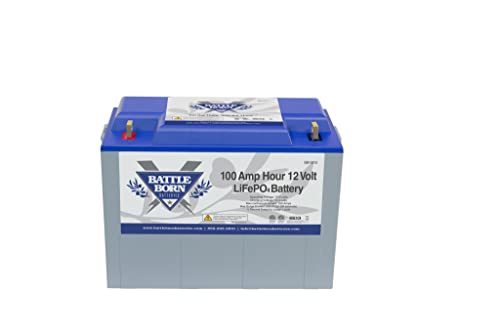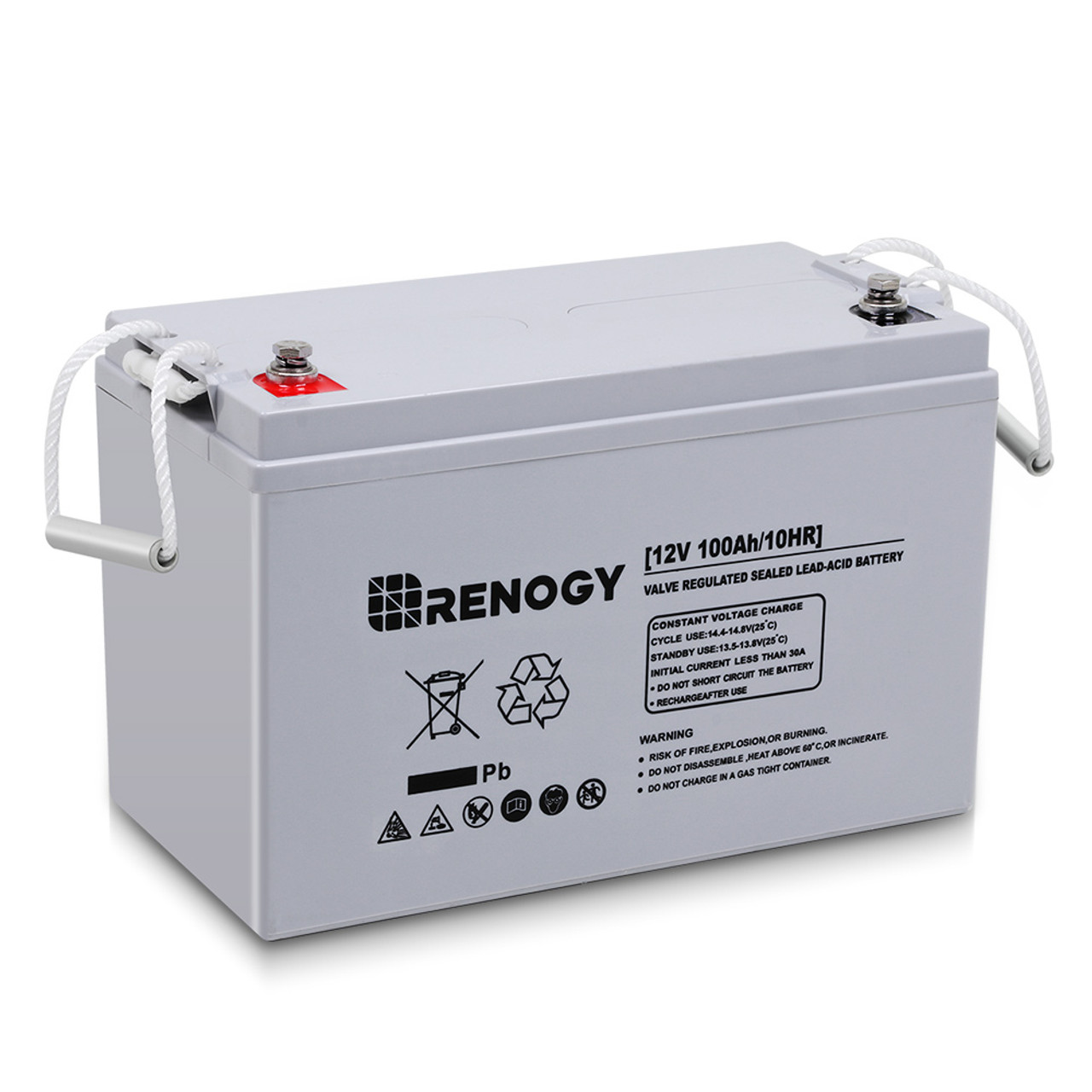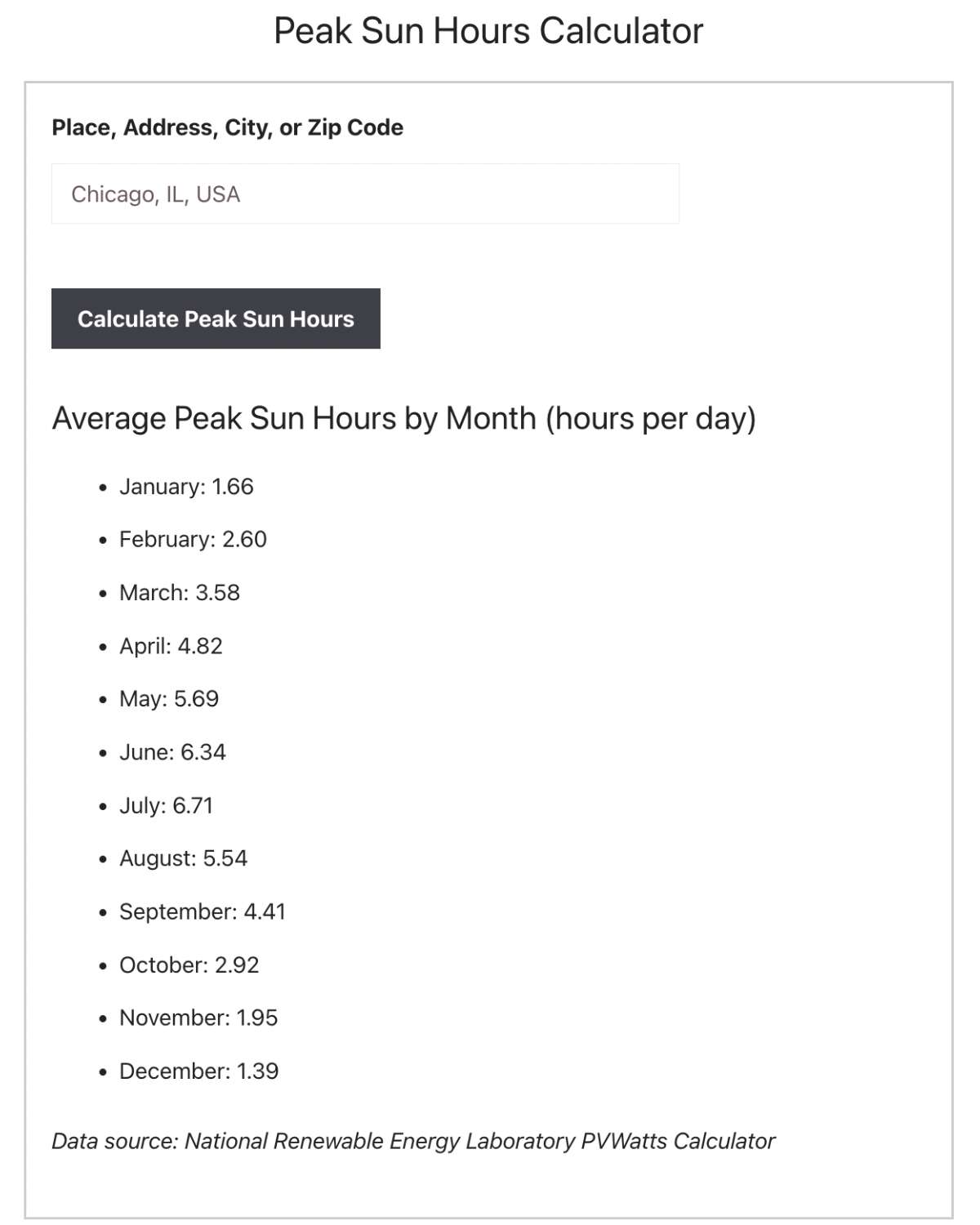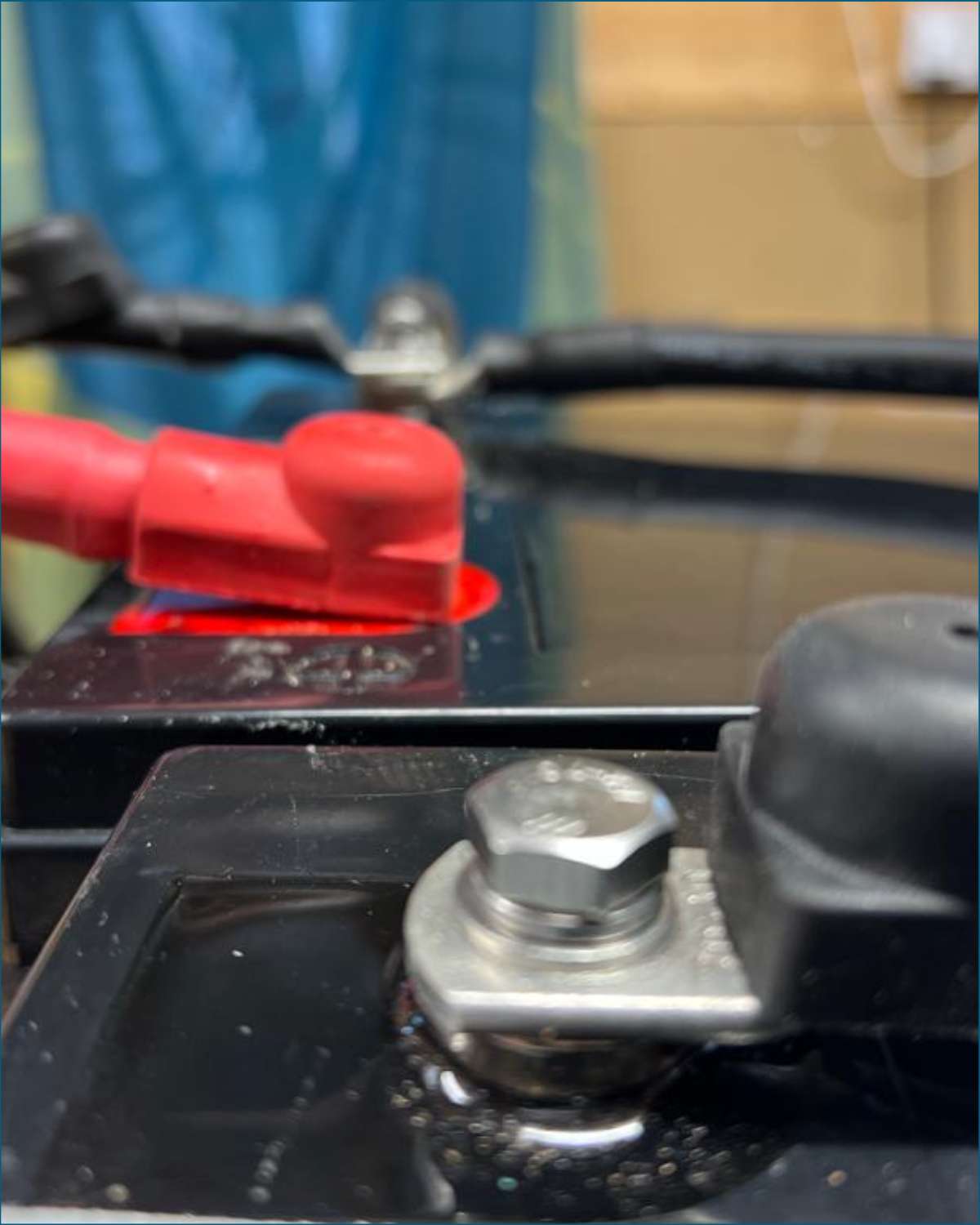Discover the best deep cycle battery for RV adventures in 2023 – reliable power for your journey!
What’s the one thing that all RV-ers have in common?
It’s this: you’ve got a long list of gear to shop for, but it’ll take time to make sure those parts are compatible.
A perfect example of this is when you’re shopping for deep cycle RV batteries to keep the lights on while boondocking.
Don’t worry, though.
This guide will save you a lot of precious time in that regard. By the time you reach the end, you’ll be familiar with the best deep cycle batteries on the market today.
Better yet, you’ll know which one will meet your needs perfectly.
So, let’s get started.
When you click on links to various merchants on this site and make a purchase, this can result in this site earning a commission. As Amazon Associates, we earn from qualifying purchases. For more info, please check our disclosure page.
At a Glance: Best Deep Cycle Battery for RV Campers
 |
1. Battle Born LiFePO4 Deep Cycle Battery
|
CHECK PRICE ► |
| < |
2. WindyNation BattaMax AGM Battery
|
CHECK PRICE ► |
3. Universal Power Group – Solar Wind Battery
|
CHECK PRICE ► | |
 |
4. Renogy Deep Cycle AGM Battery
|
CHECK PRICE ► |
5. VMAX High-Performance AGM Battery
|
CHECK PRICE ► |
1. Battle Born LiFePO4 Deep Cycle Battery – Overall Best Deep Cycle Battery For RV

Features
- Vehicle Service Type: Trailers, vans, boats
- Terminal: 5/16” x 1”, 5/16” x 1.25”
- Battery Cell Composition: Lithium-Ion, 4 cells
- Voltage:12 Volts
- Unit Count: 1
- Weight: 29 pounds
- Dimensions: 12.75 inches long, 6.88 inches wide, 9 inches high
Battle Born Batteries starts this list with their LiFePO4 deep cycle battery. It’ll deliver awesome power with a 200-amp surge output for 30 seconds before switching to a 100-amp continuous output.
Let’s suppose your system already features a lead-acid battery with a LiFePO4-compatible solar controller battery charger. In that case, this 12-volt unit will serve you well as a drop-in replacement.
But even if you don’t, this Battle Born battery stands out with its exceptional longevity. You can expect it to last 10-15 years or run through at least 3,000 to 5,000 cycles before it loses part of its capacity.
What We Like
One thing to love about this Battle Born battery is its lifespan. You can reasonably expect this battery to last you 10-15 years. Another way to look at it is that it’ll run through at least 3,000 to 5,000 cycles before it loses some of its capacity.
To put those numbers into context, 1 cycle is when the battery uses 100% of its energy and then recharges back to its maximum capacity.
Overall, it’s a durable and powerful long-term investment. Once you put it in your RV, you won’t have to worry about it for a very long time.
What We Don’t Like
Unfortunately, this battery is pretty large and heavy. That can be an issue if you prefer things to be compact and lightweight.
Pros
- Excellent warranty
- High-performance battery
- Long-lasting
Cons
- No cranking power
- Somewhat heavier than other batteries
- Requires more space
2. WindyNation BattaMax AGM Battery – Best Budget-Friendly Deep Cycle Battery For RV
Features
- Vehicle Service Type: Trailer
- Terminal: T11 terminal
- Battery Cell Composition: Absorbent Glass Mat (AGM)
- Voltage: 12 Volts
- Unit Count: 1
- Weight: 67 pounds
- Dimensions: 13 inches long, 6.8 inches wide, 8.7 inches high
WindyNation joins this list with its BattaMax AGM battery. Overall, this 12-volt, 100 amp-hour battery will provide you with excellent performance for the price you pay.
WindyNation originally designed this battery for military use. So when you combine that kind of design with the battery’s Absorbent Glass Mat (AGM) technology, what you get is an incredibly robust battery that can still deliver an excellent charge even in extreme hot and cold temperatures.
On top of that, this battery also has quick recharge times, so you can replenish the charge pretty quickly when you turn the engine on or get access to shore power.
What We Like
What we like the most about this WindyNation battery is how well it holds its charge, and also how fast it recharges. Combining those two traits will make for an excellent dry camping experience.
Firstly, you’ll be able to run your appliances for longer without draining your battery. Even if you do, recharging it to max won’t take long.
What We Don’t Like
Sadly, this battery lacks a lot in the portability department. Firstly, it’s pretty heavy at 67 pounds. It doesn’t help that the battery doesn’t have any handles built into it.
So, getting it into your RV is going to be one challenge. But if you ever need to change it out, that will be another problem as well.
Pros
- Uses Absorbent Glass Mat (AGM) technology
- Maintenance-free and spill-proof
- Resistant to excess vibration
Cons
- No cranking power
- Difficult to carry around
3. Universal Power Group – Solar Wind Battery – Best For Solar Charging
Features
- Vehicle Service Type: Trailer
- Terminal: T11 terminal
- Battery Cell Composition: Absorbent Glass Mat (AGM)
- Voltage: 12 Volts
- Unit Count: 1
- Weight: 67 pounds
- Dimensions: 13 inches long, 6.8 inches wide, 8.7 inches high
Universal Power Group (UPG) earns its place on this list with its UB121000 model battery. Not only does this unit pack a high capacity of 100 AH, but it also offers a lot of value that comes with it as well.
Firstly, UPG has done an excellent job with the design and build of this model. It’s not as wide as some of the other batteries in this review. Combine that with the fact that you can mount this battery in any way you want, and what you have is a battery that offers much more flexibility in terms of where and how you mount this in your RV.
What We Like
We had to put this battery on the list because of how well it works alongside solar panels. These days, many RV-ers are converting over to renewable energy sources, especially when dry camping. Pair this battery with a couple of solar panels, and you can run your appliances almost forever.
What We Don’t Like
Despite the battery’s weight, the handle isn’t as durable as it should be. So, you’ll have to practice extra caution when moving it around. You don’t want the handle to break while the battery is directly above your feet.
Pros
- Maintenance-free
- High-capacity
- Charges fast with solar panels
Cons
- Heavy
- Flimsy handle
4. Renogy Deep Cycle AGM Battery – Best For Sequencing

Features
- Vehicle Service Type: Trailer
- Terminal: M8
- Battery Cell Composition: Absorbent Glass Mat (AGM)
- Voltage: 12 Volts
- Unit Count: 1
- Weight: 129 pounds
- Dimensions: 20.5 inches long, 9.4 inches wide, 9.4 inches high
Let’s suppose you’re looking for a battery that has twice the output of a standard one and works well in all climates. Well, Renogy has got precisely what you’re looking for.
At 200Ah, this battery has a whopping output that will run pretty much anything you have in your RV. But that’s not the only good thing about this particular unit.
RV-ers wishing to sequence their batteries will find this Renogy model to be a perfect solution. You can connect up to 4 of these batteries in series, allowing you to create an RV system of up to 48 volts.
What We Like
This battery has lots of output and can handle itself well in extreme temperatures. But what we like the most is that this battery is ideal for sequencing.
By connecting up to 4 of these batteries in series, you can build an RV system of up to 48 volts. That’s something that lithium batteries can’t accomplish since you normally can’t build battery banks as big as that.
What We Don’t Like
One issue with this battery is the form factor. The width and height are what you’d expect from a standard RV battery. However, it’s almost twice as long at 20.5 inches.
So, you might have to rearrange a few things in your RV if you’re upgrading from a smaller battery.
Pros
- Made with corrosion-resistant alloys
- High-quality build
- Discharges well in extreme temperatures
Cons
- Twice as long as standard batteries
- Heaviest battery in this guide
5. VMAX High-Performance AGM Battery – Most Lightweight And Compact Deep Cycle Battery For RV
Features
- Vehicle Service Type: Trailer
- Terminal: 6mm terminal posts
- Battery Cell Composition: Absorbent Glass Mat (AGM)
- Voltage: 12 Volts
- Unit Count: 1
- Weight: 25 pounds
- Dimensions: 7.7 inches long, 5 inches wide, 6.1 inches high.
Lastly, we have this VMAX High-Performance AGM Battery. With a small form factor and strong output, this battery will discreetly stay out of sight while keeping your RV appliances running.
Don’t let the smaller-than-average size fool you, though. This heavy-duty battery charges up quickly while producing barely any heat at all.
What We Like
We like how this battery combines some of the best qualities you could hope for in a deep-cycle RV battery. It takes up little space, it holds a substantial charge, and it can keep up with energy-hungry appliances.
What We Don’t Like
Despite all the positives, this battery doesn’t have as sturdy a build as other batteries on this list. Sure, it’s small and light enough to carry around without any problem. However, it might not handle being dropped on a hard surface.
Pros
- Almost no heat while charging
- A durable carrier adds to the portability
Cons
- Not waterproof
- Not particularly strong or sturdy
Key Difference Between Batteries For RV, Campers, And Trailers
With so many deep cycle batteries on the market, how do you decide which one will suit your needs? Well, that depends mainly on the type of vehicle you’re using.
RVs, campers, and trailers all require deep cycle batteries. However, the critical difference between them is how much energy each vehicle type requires.
Here are the key differences you’ll need to understand to choose the best deep cycle battery:
- Campers are the smallest among all three vehicle types. People often take these vehicles camping for short periods. So, the priority here is likely to be a portable, compact, and lightweight battery.
- For trailers, people usually park them in trailer parks with easy access to shore power. So, you might not need a battery with such high capacity since you’ll rely more on what’s available nearby.
- An RV is larger, and it can fit more people. If you have one, you’re likely to be on the road a lot. Both factors mean that the vehicle requires more battery power, which is why it’s a better idea to invest in a heavy-duty battery with a higher capacity.
As you can see, choosing the best battery for your vehicle will depend on how you plan on using it. Once you understand that, making the right choice isn’t so difficult.
RV Battery Types
There are 4 battery types that you need to be aware of. They are:
- Flooded Lead Acid (FLA) batteries
- Gel batteries
- Absorbed or Absorbent Glass Mat (AGM) batteries
- Lithium-ion batteries
Gel, AGM, and lithium-ion batteries are popular choices because they’re maintenance-free. However, they do involve a higher upfront cost. That’s especially true with lithium-ion batteries because they offer more power and are lighter.
Flooded Lead Acid (FLA) batteries are cheaper to buy, but you have to maintain them by adding water every 2-4 weeks.
What Voltage Is An RV Battery?
An RV battery in excellent condition will have a voltage of around 12.6 Volts.
How Does A Lithium Battery For RV Work?
Lithium-ion batteries are a relatively new option for RV batteries, compared to AGM models, for example.
Overall, these batteries are more efficient than other types, though they used to come with a bigger price tag.
These days, Lithium batteries are more affordable than they’ve ever been.
Lithium batteries function in the same way as AGM models, as long as parts like the solar controller and battery charger come with lithium or LiFePO4 charging profiles.
The main difference with Lithium batteries is in how you charge them while driving. Typically, you’d charge an AGM battery with either VSR or B2B battery chargers.
Lithium batteries, however, require a B2B charger but not voltage sensing relays.
Conclusion
All things considered, our choice for the best overall RV battery is the Battle Born 100 Ah LiFePO4 12 Volt Deep Cycle Battery.
Lithium batteries like these are known for exceeding the performance of other batteries with a higher number of cycles and an even longer lifespan.
Unfortunately, they’ve also been known to be more expensive than AGM batteries which have been around for much longer.
Well, all of that seems to have changed over the past couple of years. These days, lithium batteries have become more affordable, with some even being cheaper than AGM models.
Graham Bogie

Graham is a seasoned marine electrical engineer with two decades of experience designing customized electrical systems for plant machinery and converting campers and overland vehicles. His expertise has led him to author the reputable Campervan Electrics Handbook and become the chief designer of the RV Wiring Design Tool. As a knowledgeable figure in the field, his YouTube channel, blog, Facebook group, and newsletter, offering electrical advice and product reviews, reach more than a million users each year.






